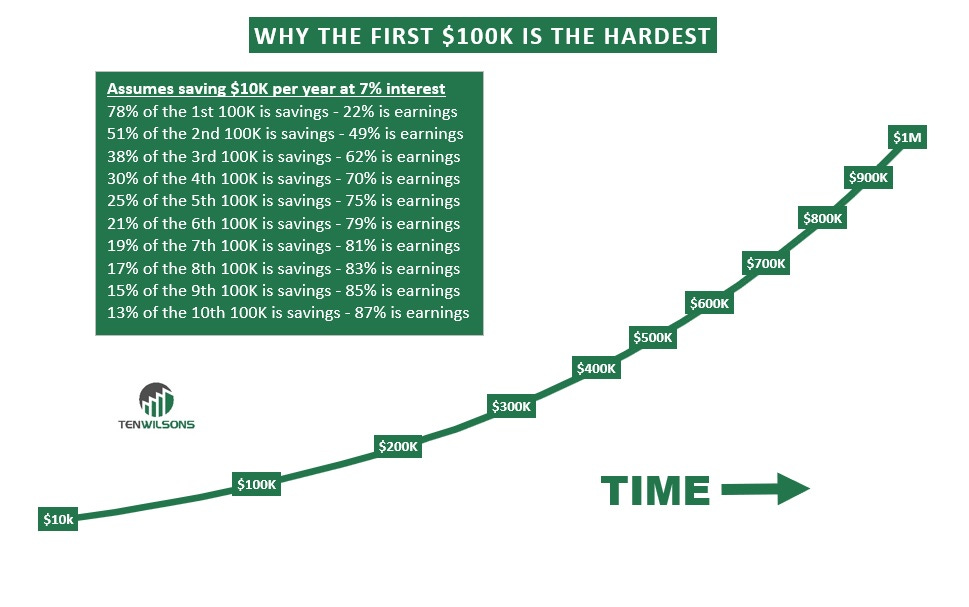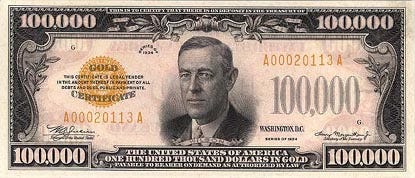Why do humans struggle to understand the exponential effects of compounding?
Why you should recognize and celebrate each $100K net worth milestone
Compounding is EXPONENTIAL and humans are hardwired for LINEAR thinking
One of the most exciting things about observing others net worth progressions is seeing the same trend: It takes years to save the first $100K, but after crossing that threshold, compounding starts to push net worth higher at a faster and faster rate as each year passes. After a decade or two, it might only take months or even only weeks to achieve another $100K net worth addition.
It’s just Math!
Saving the first $100K is the hardest! However, once you reach the cross-over point, your net worth increases faster from earnings than from your contributions. The graphic below (assuming the same annual contribution and the same interest rate) explains why net worth begins to take off like a rocket ship after crossing the $100K threshold. The magic of compound interest doesn’t tend to reveal itself until you cross the $100K net worth mark. In fact, it’s slightly after that (the $200K-$300K point) that you have enough savings for compounding to have a noticeable impact. Once you reach this cross-over point your net worth increases faster from earnings than from your contributions - that means your money is now working harder than you are for the next $100K.
Higher Earnings —> Higher Contributions
The other main factor in crossing the next $100K net worth threshold faster as time goes on is not just compounding. Typically, as earnings increase, savings or contributions increase over time as well. So it’s not just this regular compounding (assuming same annual contributions) but you can have the accelerant of higher contributions.
Celebrate each Net Worth Milestone
These milestones typically represent invisible wealth. Building this invisible wealth requires forgoing some consumption or visible wealth (second homes, new cars, vacations, etc). It’s likely money in your 401(k), your savings or brokerage account or it’s paying down debt that increases your net worth. You can share net worth milestones with your spouse (if you are married) but this is not likely something you can share with friends or family. TenWilsons and NetworthShare strive to continue building a community where you can share these milestones anonymously and be encouraged in an environment of like-minded people.
Calculating Time between Financial Milestones
Here is an snippet from NetworthShare.com (username: gammj) who has 22 years of monthly net worth entries. As you can see, it took 8 years (age 22 to age 30) to obtain first $100K in net worth, ~5 years for the second $100K in net worth and only 7 months for the most recent +$100K in net worth (from July 2023 to February 2024). This is not atypical. We have hundreds and even thousands of similar net worth progressions.
Net Worth Progression from OneWilson to TenWilsons
The $100,000 bill is the highest denomination ever issued by the U.S. Federal Government. Woodrow Wilson is the president on the $100,000 bill.
In theory, if you had one of these $100,000 “virtual” bills you would have $100,000 net worth. If you had 2 Wilsons you would have a $200,000 net worth. Therefore, if you had 10 Wilsons you would have a $1 million net worth.
One of our new specific goals is helping 10,000 Gen Z teenagers / young adults (ages 13-27) reach OneWilson = their first $100K of net worth!
TenWilsons = Millionaire
What milestone have you recently passed? How long did it take for your first $100K in net worth?
Please share your milestone in the comments below. Your story will provide encouragement to others.
Looking for more TenWilsons content?
Follow TenWilsons on twitter where you can get daily content and other helpful financial tips.
Please like and share with others!
If you enjoyed this article, please press the like button (at the top or bottom). Please forward this email to any kids, grandkids, nephews, nieces, friends with kids that are in Gen Z (ages 13-27) so they can take advantage of compounding!!






Fantastic article, many people find difficult to comprehend compounding interest and what it could mean for them
My first $100K in net worth was at age 27.